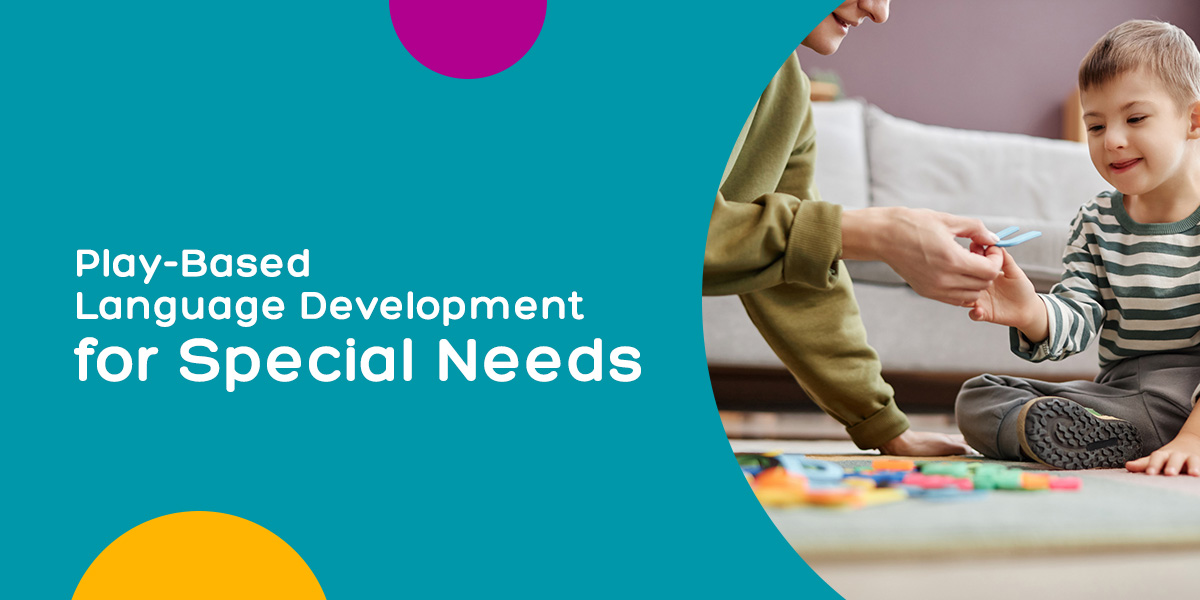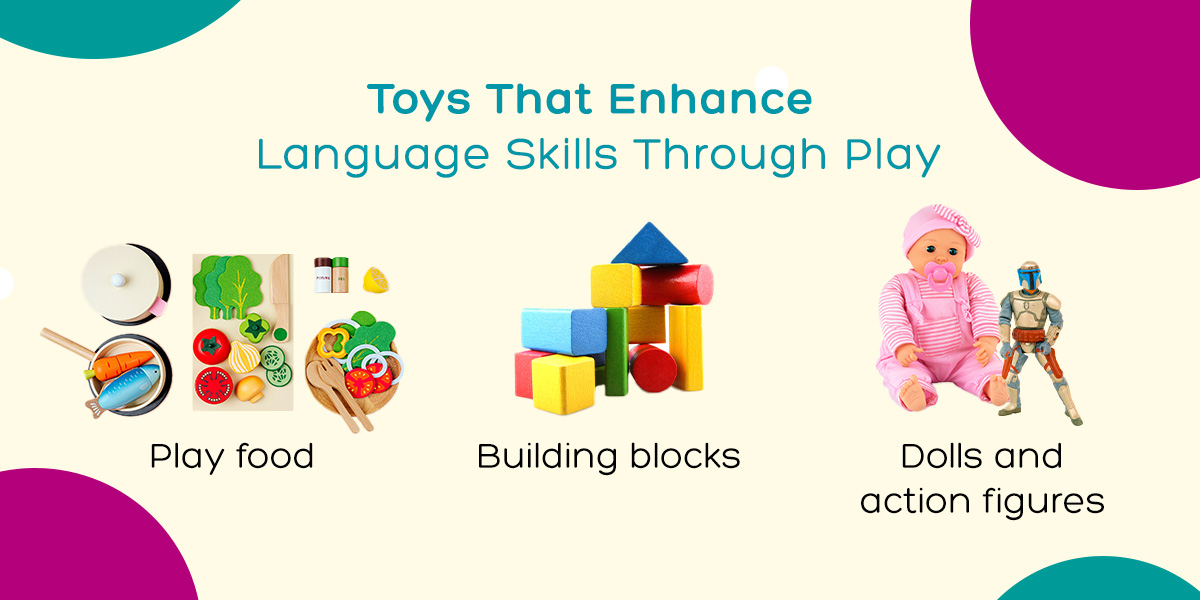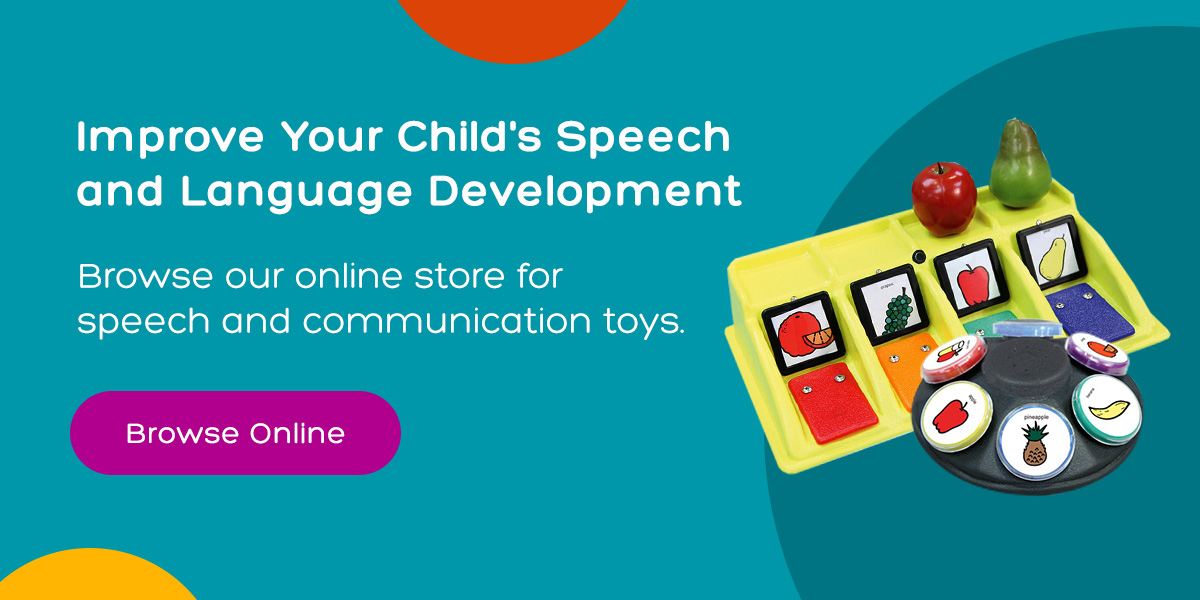Play is an important part of a child’s early life. Besides getting active and having fun, playtime is critical for developing speech and language skills. Language development is how children understand and communicate using language. Some children with functional needs (commonly referred to as special needs) or Autism Spectrum Disorder (ASD) need more support to develop their vocabulary as well as encouragement to express themselves through language.
Combining play and development in play-based learning helps support children with special needs when it comes to language development. Play-based learning is built on children’s innate desire to play. Parents and teachers provide materials and suggest goals, and children initiate the play, using their creativity and curiosity to learn and develop.
Play provides a fun, stress-free environment that helps children with functional needs acquire and use language. Language development toys and activities are helpful tools to enhance language acquisition.
How Play Is Connected to Speech and Language Development
While playing seems like a break from learning, playtime significantly impacts a child’s physical, emotional, social and cognitive development. Since playtime isn’t structured, children with functional needs can learn naturally, discovering new things at their own pace based on their interests.
Playing gives children an opportunity to understand the world through hands-on experience as well as practice their communication skills by:
- Expressing thoughts and ideas: Conversations during playtime teach children how to articulate and share their thoughts with their peers and teacher. They will also have practice understanding others’ thoughts and ideas.
- Listening and responding to others: Interactive play requires communication. Children can practice their listening skills and taking turns when speaking. For games with structured rules, following instructions has several language development opportunities.
- Cooperating in groups: Playing with others teaches children how to cooperate with their peers by working together and taking turns with toys.
- Increasing vocabulary: Playing with other students, parents and teachers introduces children to new words. They can learn these words and use them when expressing their thoughts.
- Building sentences: During conversations, children can understand grammar rules, like how to form sentences.
- Storytelling and narration: Pretend play usually involves telling a story, so children can use their imagination to think of a narrative and practice communication skills to share the play scenario.
Playtime offers many opportunities for children with functional needs to talk to and work with their teacher and other students, developing social skills in the process.
Types of Play for Speech Development
The following types of play provide ample opportunities for children with special needs to develop their language and speech skills:
- Pretend play: Imaginative play is effective for oral language development because it is a fun way to practice speech. This type of play encourages children to use their imaginations to create pretend scenarios and act out a role. As kids act out the scene, they use communication to explain the scenario and interact with others.
- Independent play: Independent play allows children to play on their own with their parent or teacher nearby for support and safety. This type of play gives children the freedom to explore and express themselves.
- Open-ended play: Open-ended play provides children with toys that can be used in various ways, so they can use their imagination to explore and learn. Toys like art supplies, balls and building blocks encourage open-ended play.
- Rule-based play: Examples of rule-based play are games and activities that require children to follow instructions. This type of play strengthens language comprehension and cooperation with peers, like working on puzzles or sorting objects together.
Toys That Enhance Language Skills Through Play
Games, activities and lessons designed around playtime create impactful ASD language development opportunities for children of all actual and development ages. Some toys that build speech and language skills include:
- Play food: Play food increases vocabulary as kids learn the names of various foods. Children can also practice action words and following directions by acting out making a recipe.
- Building blocks: Building blocks encourage kids to use their imagination and be creative. They can practice short phrases and learn to take turns when building structures with other children.
- Dolls and action figures: Children can use dolls to play out activities of daily living and practice using short phrases, actions and emotions.
Practical Tips for Parents and Educators to Support Their Child’s Language Development
Parents, caregivers and teachers can incorporate play-based language activities into daily routines to encourage language development using these strategies:
- Model language use: When playing with your child, model language and give them an opportunity to respond. Describe actions or have them describe their experience.
- Adapt the activity as needed: Every student learns at a different pace and displays different levels of development during play. Adapting playtime to meet your students’ needs aids their language skill development progress.
- Ask open-ended questions: Ask your child about the toy or game to promote thinking.
- Read together: Read books aloud to your child to help them recognize words and promote language development. Choose a story your child will find interesting and ask for predictions about what will happen.
No matter how you incorporate oral language development into your child’s daily routine, it’s important to:
- Provide positive feedback and encouragement: Encourage your child to communicate and celebrate their efforts, so they feel supported and use their language skills in everyday life.
- Be patient: Give your child the time they need to process their thoughts and respond.
Language Development Toys at Enabling Devices
Enabling Devices has a wide selection of toys to support communication and encourage interaction. These toys engage children during play, encouraging them to explore, have fun and develop their language skills. These games are also adapted, so children of any actual and development age and ability can play.
Examples of these toys include:
- Adapted Pie Face: Adapted Pie Face is a fun and delicious game where you score points every time you activate the switch without getting whipped cream on your face.
- Tic Tac Toe: Tic Tac Toe uses an external capability switch to set X’s and O’s in a line. Children can interact with each other while following directions and taking turns.
- Bingo: Bingo includes a switch-activated bingo cage, so everyone can play this classic game.
- Hi Ho Cherry-O: Hi Ho Cherry-O is a fruitful game where kids can pick cherries to practice counting and basic math skills while playing together.
Improve Your Child’s Speech and Language Development With Enabling Devices
Enabling Devices designs language development toys and assistive technology to help children with functional needs practice and improve their communication skills. Our devices, toys and tools help build more joyful, fulfilling lives for people with disabilities.
Browse our online store for speech and communication toys. Learn more about oral language development tips by exploring our blog or contacting our team.
Linked Sources:
- https://enablingdevices.com/product-tag/developing-cognitive-skills/
- https://enablingdevices.com/product-tag/supporting-communication/
- https://enablingdevices.com/product-tag/encouraging-interaction/
- https://enablingdevices.com/product/adapted-pie-face/
- https://enablingdevices.com/product/tic-tac-toe/
- https://enablingdevices.com/product/bingo/
- https://enablingdevices.com/product/hi-ho-cherry-o/
- https://enablingdevices.com/shop/
- https://enablingdevices.com/blog/
- https://enablingdevices.com/contact/





